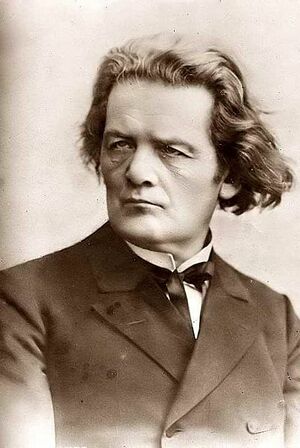Anton Rubinstein
Anton Rubinstein was a Russian pianist, composer, conductor and teacher (b. 16/28 November 1829 in Vikhvatinets; d. 8/20 November 1894 in Peterhof), born Anton Grigoryevich Rubinshteyn (Антон Григорьевич Рубинштейн).
Tchaikovsky and Anton Rubinstein
Born into a humble family of Jewish origins, but raised in the Christian faith, both Anton and his younger brother Nikolay (1835–1881) showed early musical aptitude. Anton received piano lessons from his mother at the age of five, and within four years he had given his first public recital, and then toured through Western Europe and Russia with his tutor Aleksandr Villoing (1808–1878), and brother Nikolay.
Returning to Russia in 1848 he taught, gave recitals, and became a leading figure in Saint Petersburg's musical world. With the support of the Grand Duchess Yelena Pavlovna (1807–1873), he established the Russian Musical Society in 1859, and founded the Saint Petersburg Conservatory three years later. Tchaikovsky was a student of Rubinstein's instrumentation classes in the conservatory's first intake, but relationship between master and tutor was by no means an easy one, and the young student's works were often judged very harshly. Nevertheless, Rubinstein recommended Tchaikovsky for the post of professor of harmony at the Moscow Conservatory, after his graduation in 1866.
In 1873, Tchaikovsky dedicated his Six Pieces on a Single Theme, Op. 21 for piano to his former tutor, and also supplied two pieces for the celebrations of Anton Rubinstein's fiftieth year as an artist in 1889: the chorus A Greeting to Anton Rubinstein and the piano Impromptu in A-flat major.
Anton Rubinstein's fame continued to grow at home and abroad, and after resigning his position at the Saint Petersburg Conservatory in 1867 as a result of tensions within the faculty, he devoted his time to giving concert tours in Russia, Western Europe and (in 1872/73) the United States. After briefly returning to the conservatory (1887–91), he then settled in Dresden, and only returned to Russia three years later when his health began to fail. He died at Peterhof, Russia, on 8/20 November 1894, as a result of heart failure, aged 64.
Tchaikovsky's Arrangements of Works by Rubinstein
- Ivan the Terrible, TH 177 (1869) — arrangement for piano 4 hands of Rubinstein's characteristic musical picture for orchestra, Op. 79 (1869)
- Don Quixote, TH 180 (1871) — arrangement for piano 4 hands of Rubinstein's comic musical picture, Op. 87 (1870).
Tchaikovsky's Translations of Works by Rubinstein
- Twelve Persian Songs, TH 334 (1869) — translation from German to Russian of Rubinstein's Zwölf Lieder des Mirza-Schaffy, Op. 34 (1855)
- Songs and Romances, TH 335 (?1870–71) — Russian translations of nineteen song texts (from Opp. 32, 33, 72, 76 and 83) from German, French, Italian and English, for a collected edition published by Vasily Bessel.
Dedications
Tchaikovsky dedicated three of his works to Anton Rubinstein:
- Six Pieces on a Single Theme, Op. 21, for piano (1873) — "à Monsieur Antoine Rubinstein"
- A Greeting to Anton Rubinstein, for mixed chorus (1889)
- Impromptu in A-flat major, for piano (1889).
In 1876, Rubinstein dedicated his Scherzo in F major — later published as cahier 5 of the Verschiedene Stücke, Op. 93 — to Tchaikovsky.
Correspondence with Tchaikovsky
2 letters from Tchaikovsky to Anton Rubinstein have survived, dating from 1887 and 1891, both of which have been translated into English on this website:
- Letter 3213 – 30 March/11 April 1887, from Maydanovo
- Letter 4392 – 2/14 June 1891, from Maydanovo
3 letters from Anton Rubinstein to Tchaikovsky, dating from around 1887, are preserved in the Tchaikovsky State Memorial Musical Museum-Reserve at Klin (a4, Nos. 3831–3833).
Bibliography
- [Letter from Tchaikovsky to Le Gaulois] (1883)
- [Letter from Tchaikovsky to the Moscow Register] (1889)
- Anton Rubinstein. Ein Künstlerleben (1892)
- Чайковский дирижирует ораторией Вавилонское столпотворение (1893)
- П. Чайковский об А. Г. Рубинштейн (1893)
- П. Чайковский об А. Г. Рубинштейн (1893)
- Десятилетие со смерти П. И. Чайковского. По поводу А. Рубинштейна (1903)
- А. Г. Рубинштейн (1905)
- The deaths of Tchaikovsky and Rubinstein (1923)
- The deaths of Tchaikovsky and Rubinstein (1924)
- Смерть Чайковского и Рубинштейна (1927)
- Братья Рубиншетейны и Чайковский (их сходства и контрасты) (1937)
- Воспоминания о П. И. Чайковском (1962)
- Из воспоминаний о П. И. Чайковском (1962)
- Из воспоминаний о П. И. Чайковском (1973)
- Воспоминания о П. И. Чайковском (1973)
- Из воспоминаний о П. И. Чайковском (1979)
- Воспоминания о П. И. Чайковском (1979)
- Воспоминания о П. И. Чайковском (1980)
- Из воспоминаний о П. И. Чайковском (1980)
- Nationalism, modernism and personal rivalry in nineteenth-century Russian music (1981)
- П. И. Чайковский и Н. Г. Рубинштейн (1866-1881 гг) (1983)
- Souvenirs de Tchaïkovski (1985)
- Восторг и боль Чайковского. По следам забытого письма (1992)
- Alexandra Panayeva (1993)
- B-moll (1993)
- Tchaikovsky and Anton Rubinstein (1999)
- Čajkovskij und die Brüder Anton und Nikolaj Grigor'evič Rubinstejn (2006)
- П. И. Чайковский. Преподаватель Петербургской консерватории (2012)

